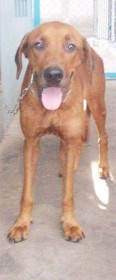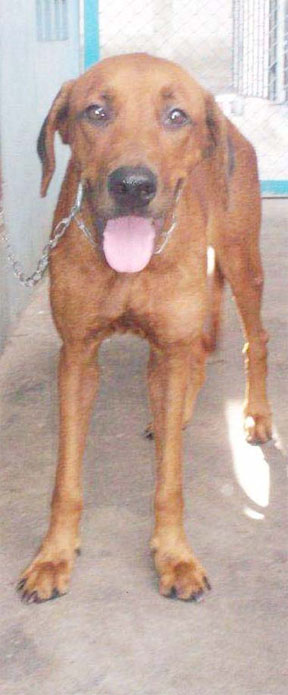Continued
Organ failures
As can be expected, as the dog gets older, some of the vital internal organs tend to deteriorate.
Urinary system
I remember (what seems to the a thousand years ago) one of my professors saying that the dog is a “nephritic.” By that, he meant that the first organ to go bad is the kidney.
In fact, it has been my experience – notwithstanding the increase in heartworm cases, especially in some specific areas – that the kidneys and urinary system can exhibit deficiencies, even when the dog is in his middle age (seven years old or thereabout).
 The dog with ailing kidneys exhibits all sorts of problems, not lastly those relating to urine discharge. That means mostly that he is giving off urine several times during the day. If it is a ‘house’ dog then, of course, you have a greater problem. In this case, you must take the dog out often during the course of the day and night.
The dog with ailing kidneys exhibits all sorts of problems, not lastly those relating to urine discharge. That means mostly that he is giving off urine several times during the day. If it is a ‘house’ dog then, of course, you have a greater problem. In this case, you must take the dog out often during the course of the day and night.
I notice owners tend to reduce the water intake, in the vain hope of reducing the urine production/excretion. This would be the wrong approach. Just the opposite: ensure that drinking water is always available. If the water intake is compromised, the animal might experience a kidney failure.
I should mention in passing, that some spayed dogs (as they get older) exhibit incontinence. It seems that this is connected to a female hormone imbalance (during the ‘spay’ operation, the ovaries are taken out). Consequently, one of the ways to treat the incontinence, if it arises in an old bitch that has been spayed, could be to administer hormone (oestrogen) injections. Also, some authors have documented that the enlargement of the prostate gland in old males that were (are) very sexually active causes ‘voidance’ problems. The theory is that the enlarged prostate gland presses against the tube (urethra) that takes the urine from the bladder to the penis for excretion. As such, the animal cannot urinate easily. I have never encountered this particular problem in patients, but only recently I had an experience with a geriatric dog, in which massive amounts of fat pressed so much against the urethra that the animal was finding it difficult to void urine. Once the fat was removed by open abdomen surgery, the urine flowed freely. I have often observed this problematic in castrated tomcats and spayed cats.
Heart
I suppose, as in humans, the heart muscles of the elderly dog become weaker as the dog gets older. This condition is not helped when the dog is living in areas where canine heartworm (a disease spread by the mosquito) is endemic – like the lower East Coast and Courida Park, for example.
The problem with heart disease is that it is insidious. Usually, your veterinarian, during the general (at least once a year) check-up, will diagnose a heart enlargement or heart murmurs or arrhythmias or the presence of heartworm. He/she will then advise you as to what steps can be taken (not lastly diet changes; obese dogs present a serious complicating factor in heart disease) to ease or cure the problem.
Of course, if the dog does not get its regular check-up, then the heart problem can exist for years undetected. By the time it is discovered, it is too late.
Perhaps I should mention some symptoms that are associated with heart failure in the older dog:
– Lethargy
– General emaciation
– Muscular atrophy (the muscle mass becomes less and less)
– Respiratory distress (shortness of
breath)
– Coughing (especially in advanced heartworm cases)
– Fainting seizures (especially after exercise and/or excitement)
I should really emphasize that fat, elderly dogs must be made to lose weight, mostly through dieting and not so much with the aid of strenuous exercise. Low salt diets must be introduced in dogs suffering from congestive heart failure. Some specific medication (eg heart stimulants and diuretics) can be of meaningful assistance. However, your vet must prescribe these drugs.
Enough for today.
Please implement disease preventative measures (vaccinations, routine dewormings, monthly anti-heartworm medication, etc) and adopt-a-pet from the GSPCA’s Animal Clinic and Shelter at Robb Street and Orange Walk, if you have the wherewithal to care well for the animals. Do not stray your unwanted pets, take them to the GSPCA’s Clinic and Shelter instead. If you do not wish your pet to have puppies or kittens, you may exploit the GSPCA’s free spay and neutering programme. If you see anyone being cruel to an animal, or if you need any technical information, please get in touch with the Clinic and Shelter by calling 226-4237.








